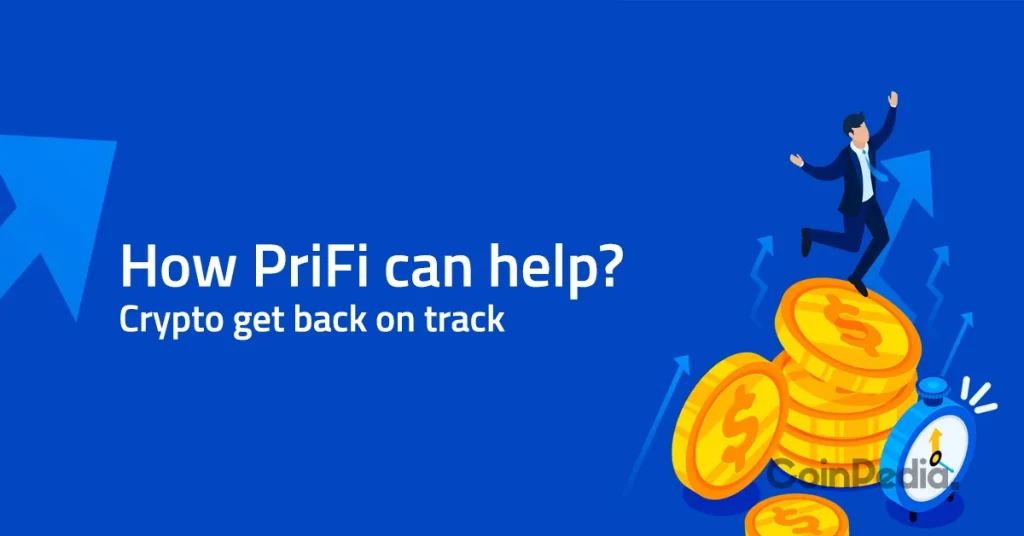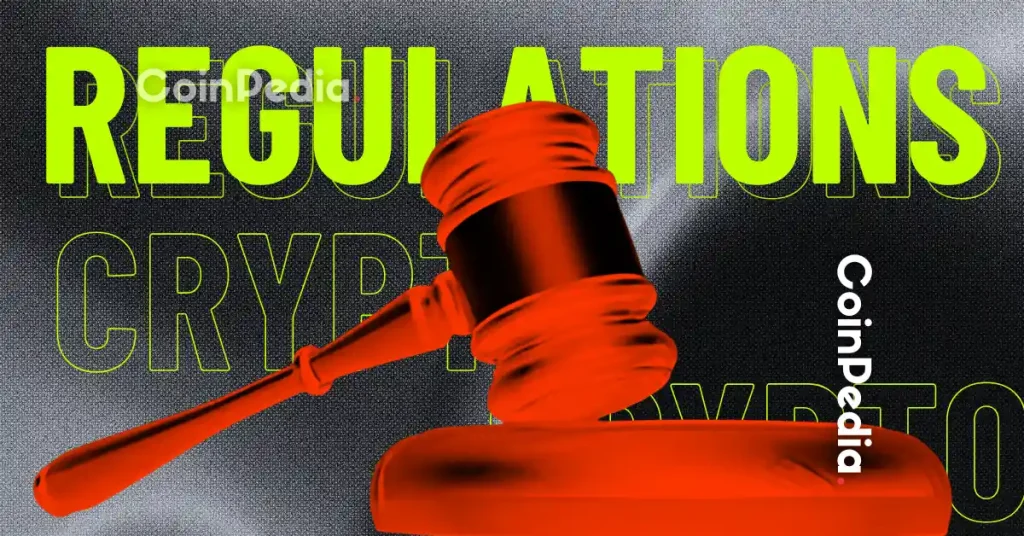
The post How PriFi Can Help Crypto Get Back on Track appeared first on Coinpedia - Fintech & Cryptocurreny News Media| Crypto Guide
Cryptocurrency’s Original Mission
It seems as though, in the hype of all things blockchain, crypto, and Web 3.0, ‘cryptocurrency’ has forgotten its original mission.
A mission that was integral to the launch of the technology in the first place. A mission that only PriFi can help it remember.
Bitcoin was invented as a backlash to the 2008 housing crisis. A crisis where governments and corporations brought the world economy to the brink of collapse through regulatory neglect and predatory lending practices.
“The Times 03/Jan/2009 Chancellor On Brink of Second Bailouts For Banks” a message coded directly into the first block of Bitcoin, a tool invented as an alternative to the existing financial system.
It was a revolutionary new technology at the time—trustless, peer to peer, distributed and completely outside the sphere of influence of governments.
Now, nearly fifteen years later, the promise behind the technology is at risk of being perverted and used against the people it was supposed to serve.
Why? Because transparency, which was once thought of as a core feature of the blockchain, can be heavily exploited as a bug, giving corporations, regulatory bodies, and worse complete insight into your finances. Forever.
Crypto has strayed away from its original mission. Here are three ways PriFi can get it back on track.
Returning Control to the User
There’s a common misconception that privacy is about hiding your activities from other people.
It’s not.
Privacy is about having the choice regarding when to reveal your information, how much information to reveal, and to whom.
All three are critical pieces of ensuring privacy, which is, in and of itself, critical to ensuring a strong blockchain future.
At present, there is little to no privacy with most blockchains. Most tout this as a perk of the technology because it gives everyone the ability to operate on an even playing field. It doesn’t.
The problem with no privacy on blockchains is that anyone with the technology able to see information, simply can. This transparency might mean people who you don’t want seeing your info such as co-workers, employers, nosy friends, could easily tap into your information.
Corporations who aim to exploit your data for their own use, or regulators who may not necessarily have your best interests at heart, would also have clear access.
The corporations profiting from data revealed on the blockchain, or regulatory bodies tapping into the blockchain information may be foreign or domestic.
Furthermore, because of the immutability of the blockchain, these corporations or governments would have the ability to tap into your financial data at any point in the future – as your data can never be deleted or destroyed.
Information is power, and control over the flow of information is an exercise of that power. Private finance (PriFi) give power back to the people.
But exploitation of your data on the blockchain is only part of the problem. As governments move to regulate and adopt cryptocurrency into their own legacy systems, PriFi, as it relates to central-bank digital currencies (CBDCs), becomes even more vital. Here’s why.
Uncertainty and Central-Bank Digital Currencies
Governments around the world have grown curious about blockchain technology, and are actively looking for ways to incorporate it into their current monetary system.
Central-bank digital currencies (CBDCs) is their answer. Cryptocurrencies are provided by the government to eventually replace cash.
Simple, easy, and convenient, these cryptocurrencies allow regulatory bodies to have direct access and control to your financial stability. To your livelihood.
The People’s Republic of China (PRC) for example, has adopted its own CBDC called the Digital Yuan.
The unique characteristics of the blockchain give the PRC the ability to observe monetary flows and react accordingly, effectively denying any transaction it feels doesn’t serve Chinese interests at the detriment of the individual.
If this seems like an extreme case it’s not. They’re already moving towards the infamous Social Credit Score, a rating that will restrict or accelerate your ability to live in their society.
The financial aspect of this system is interwoven in blockchain, given the PRC the ability to literally cut off your financial means if they choose.
The situation is worse when extrapolated to other oppressive regimes, dictatorships, or the like. For billions of unbanked people, giving the government the ability to cut off access to their livelihood would be a complete disaster.
Unfortunately, governments around the world, including Canada, United States, and the UK, are tinkering with the idea of their own CBDC. We may live to see a future where this technology is implemented and privacy is nonexistent.
Except if we have PriFi.
PriFi represents a significant opportunity, an unbreakable technological advantage, in giving people their privacy.
And this is not a technology that needs to be built from scratch. There are already interesting protocols who are pushing forward on privacy today.
PriFi Focus – Privacy Built Into The Technology
Smart contracts allow individuals to partake in transactions without the need for regulatory bodies or corporate oversight.
The trustless (you don’t need to trust the other party) aspect of smart contracts is built into the technology.
But as we’ve explored, the data on these smart contracts is stored forever, and can be forever accessed by various parties (people, corporations, regulatory bodies) for any purpose they might have.
Private decentralized smart contracts do the exact same thing as smart contracts – they allow individuals to partake in transactions without the need for regulatory bodies or corporate oversight.
Only they add multiple layers of privacy to the process, ensuring that the information of the translation is, and forever remains, private.
Leading protocols like Haven and Monero are a couple of examples of PriFi blockchain solutions. Encrypting and securing your transaction data, your personal information (wallet address etc.), they give you the user choice.
Why does that matter?
Because historically, and as you’ve likely noticed in today’s society, there’s a tendency for regulatory bodies, corporations, and other institutions of power to lean towards more control, more power, and insert themselves wherever and whenever they can.
If blockchain technology continues to allow third parties into our financial affairs, we’ll quickly discover it’s increasingly difficult to make any decision without consulting or having their approval.
Choice in who you share your data with, in what data others can see, and when they see it is needed to maintain financial independence.
Reviving Cryptocurrency’s Mission:
The original ideological point around the creation of Bitcoin and blockchain technology was that it was meant to be an alternative to the existing financial system, which was viewed as corrupt and broken after the events of the 2008 market crash.
It was intended to be a trustless, peer-to-peer service, where parties could interact with each other without needing third party interaction.
Trusting in the immutability and transparency functions of the underlying blockchain technology, was a key to breaking free.
In the nearly fifteen years since its inception, institutional actors and regulators have taken notice of the new technology and have made strides in what can only be seen as disconcerting.
These include CBDC’s, and the prospect that everyone, regulators and corporations included, can get information on every transaction that happens on the blockchain. Regardless of intent, the information is accessible and there for everyone to see.
The only solution to this is PriFi.
PriFi gives you the ability to control who, how much, and if anyone sees your data. With solutions like Haven, Monero, SecretSwap, and others already available, the question is: how long will it take before you join the PriFi future?
Author Bio:
Rarecommons fell down the rabbit hole of blockchain technology in 2017, quickly realizing that the privacy aspects of the technology are still in its infancy.
After looking into available alternatives, Rarecommons chose to support the Haven Protocol project and community, to help its Monero-based private stablecoin ecosystem develop and reach a broader audience.
Convinced that innovations like Haven Protocol help us all to see what is possible and set the stage for a brighter future, Rarecommons helps push the Haven technology to new heights. Take a look and join the community by going here: https://havenprotocol.org/

 3 years ago
287
3 years ago
287














 English (US) ·
English (US) ·